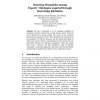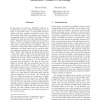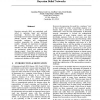114
click to vote
KBS
2002
15 years 1 months ago
2002
: We have constructed a set of ontologies modelled on conceptual structures elicited from several domain experts. Protocols were collected from various experts who advise on the se...
118
click to vote
IVS
2007
15 years 2 months ago
2007
A semantic substrate is a spatial template for a network, where nodes are grouped into regions and laid out within each region according to one or more node attributes. This paper...
114
click to vote
SIGIR
2008
ACM
15 years 2 months ago
2008
ACM
Domain expertise can have an important influence on how people search. In this poster we present findings from a log-based study into how medical domain experts search the Web for...
128
click to vote
AEI
2006
15 years 2 months ago
2006
This paper presents a linguistic framework for developing a formal knowledge acquisition method. The framework is intended to empower domain experts to specify information require...
101
click to vote
ICML
2010
IEEE
15 years 3 months ago
2010
IEEE
Variable selection for cluster analysis is a difficult problem. The difficulty originates not only from the lack of class information but also the fact that high-dimensional data ...
123
click to vote
COMAD
2009
15 years 3 months ago
2009
In this paper, we present a feasibility study in automating the insurance claims processing system related to automotive sector. In automobile insurance claims processing, usually...
140
click to vote
UAI
2007
15 years 3 months ago
2007
Bayesian networks (BN) are particularly well suited to capturing vague and uncertain knowledge. However, the capture of this knowledge and associated reasoning from human domain e...
107
click to vote
TREC
2007
15 years 3 months ago
2007
Using the same interactive IR component as for TREC 2006, this submission probed the ability of a user without requisite domain knowledge to interactively set appropriate weights....
106
Voted
SE
2008
15 years 3 months ago
2008
: In this paper we present the language Monaco, which is a DSL for programming event-based, reactive automation solutions. The main purpose of the language is to bring automation p...



